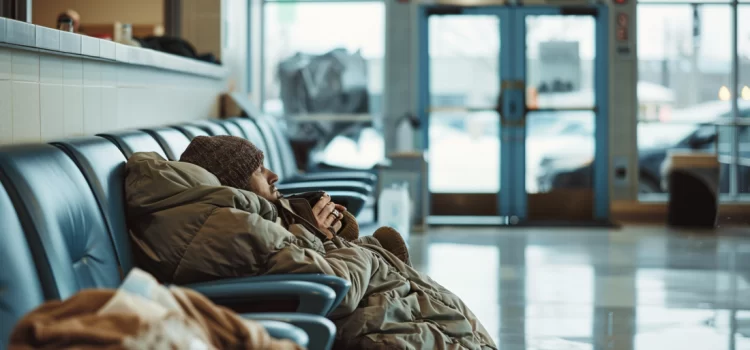
Is there a link between a lack of healthcare and the homeless? What initiatives have been taken to give the homeless necessary medical attention?
A big problem among the unhoused population in Boston is that these people don’t have easy access to medical care. In Rough Sleepers, Tracy Kidder tells the inspiring story of Jim O’Connell’s efforts to provide healthcare for the homeless.
Continue reading to learn how O’Connell changed the lives of the homeless community in Boston.
A Story of Resilience and Dedication
The lives and experiences of individuals receiving assistance and employees engaged in healthcare and the homeless initiative in Boston reveal a tapestry of profound personal stories and shared experiences. This program, committed to delivering medical services to the homeless community, has considerably impacted many lives.
The Dedication of Mission-Driven Staff
O’Connell, a veteran member of the group, demonstrates an unwavering commitment to helping Boston’s homeless population. For over three decades, he’s been an active participant in the mobile support initiative, often visiting improvised shelters with his medical kit. His dedication frequently results in personal sacrifices, such as the collapse of his marriages, yet these are balanced by the enduring connections he establishes over time.
Adaptability is a prevailing characteristic among these staff members, whether it’s due to regulatory changes or global pandemics like COVID-19. They carry the emotional and physical weight of their mission with inventiveness, finding satisfaction despite the seemingly insurmountable nature of their work.
To cope with emotional turmoil, staff members like O’Connell often engage in supportive gatherings, such as Friday night meet-ups at Doyle’s Cafe. These gatherings provide an opportunity to discuss and address their difficulties, reinforcing their commitment to the cause and the enduring positive effects on those they assist.
Resilience in the Face of Trauma: Stories of Strength
Every person seeking support from the Boston Health Care for the Homeless Program has a unique narrative marked by grief, perseverance, and occasional moments of joy. Take Tony, for instance. His unexpected creative talents reveal depths of complexity that contrast with his difficult circumstances. Then there’s John Cotrone, who conducts his daily routines in a subdued manner, even as he faces the grim reality of sleeping near trash bins each night.
These individuals, whose experiences range from scholarly pursuits to the challenges of city life, all demonstrate remarkable resilience. Tony, who grew up in the challenging environment of Boston’s North End, is a prime example of this strength.
The Complex Lives of the Homeless
You’ll find patients like Kevin Blanchard, with a history of bank robbery and time spent in prison, and BJ, who lost both limbs due to infections and extreme cold. Their stories represent a complex mix of past achievements, unwavering determination, and ongoing struggles with hardship.
These narratives not only stir feelings of sadness but also capture brief instances of triumph—be it escaping the grip of addiction, overcoming illness, or simply surviving another severe winter. They underscore the steadfast tenacity inherent in the human spirit.
Transformation and Lasting Impact
Tony’s life underwent a significant transformation thanks to the assistance from O’Connell’s team. He then became a champion and benefactor for others, exemplifying the power of change. Angie, who teeters on the brink of homelessness, continues to engage in sincere conversations with O’Connell, demonstrating her willingness to be transparent.
The story of Kevin cherishing the memory of Tony, whose gentle nature and peaceful last moments inspired numerous individuals, underscores the deep bonds formed in this community during challenging periods.
This powerful narrative depicts the profound and mutual impact between the individuals receiving care and the Boston Health Care for the Homeless Program. It shows that the program’s effect extends beyond quantifiable metrics, while the patients have left an enduring impression on the compassionate staff members.






